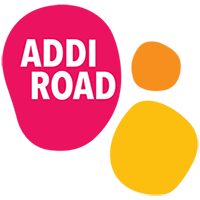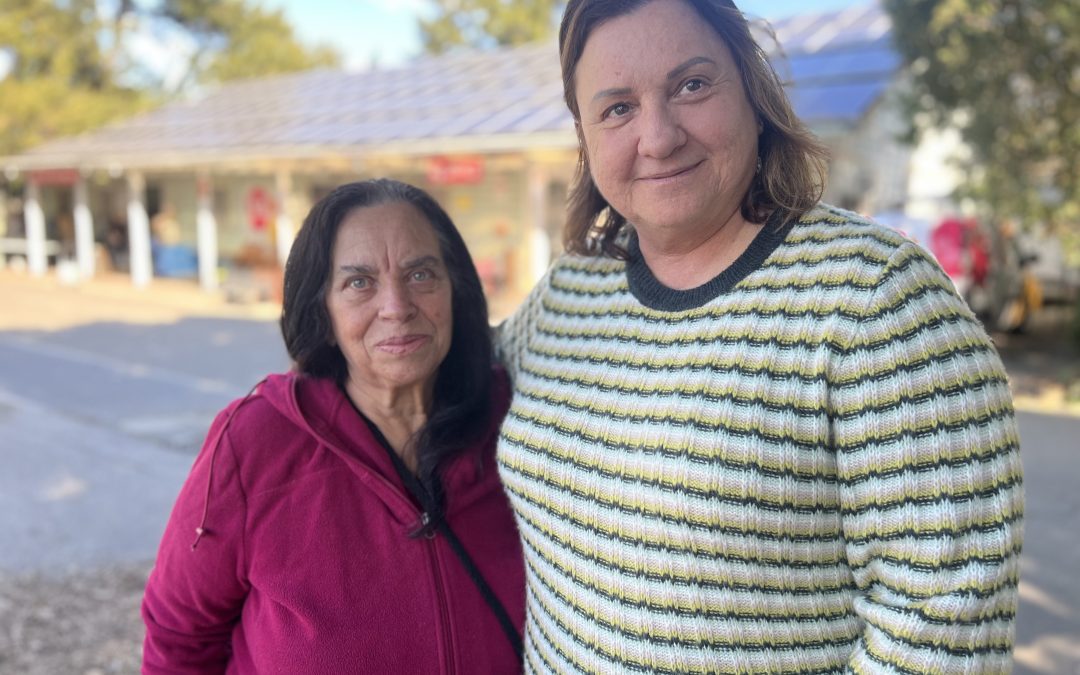Fragments and tears; big feelings in each silence that falls between the words.
Maria Fotiadis has had a long history with Addi Road, going back to the early 1970s when the Greek community began gathering here in Marrickville, bringing to life what would be formally established as the Addison Road Community Centre in 1976.
She remembers the other communities that allied with them, the Turkish and Yugoslav and Italian people in particular, the nights they’d organise to sing, play music and dance and celebrate each nation’s unique culture and history. It was a hotbed of activity helping to inspire what the Whitlam era Minister for Immigration, Al Grassby, would famously define as ‘multiculturalism’.
All her life Maria has kept returning to Addi Road. Through fitful English and a flurry of Greek interpreted for Maria by Dina Petrakis, the CEO of Ethnic Community Services Co-operative (ECSC) and an Addi Road Board Member, Maria tells bits and pieces of her story, less of an A to Z tale than an emotional leap into each moment that affects her as she speaks.
A small woman of bird-like intensity it comes as no surprise she is a singer. Maria remembers nights back when Addi Road began, performing with her friends the First Nation poet Bobbi Sykes and the great Australian folk artist Jeannie Lewis. Maria remembers Sykes telling her “in gaol we are free, outside we are like slaves”. A bitter half-truth that stabbed at her heart and still does. Maria would translate and perform a Sykes poem in Greek, reducing her friend to tears. She’d also write a poem of her own back in 1973, acknowledging Addi Road as Aboriginal land, first and foremost, never ceded.
“Wonderful years,” Maria says a few times in English, the presence of her friend Bobbi Sykes made all the nearer by the ground she stands on once again. And Jeannie Lewis? she asks. Have we heard of her? Where is Jeannie? “I try to find her. Is she alive?” We think she is and we know somebody who might be able to track her down. Maria would like that a lot.
She grabs at her chest, theatrically and to explain, dismissing her own singing as “not professional”. Then she elaborates even more. Her singing was “of the people, for the people. I’m not a business or career singer.” It’s hard to her to get at what she means. Maria pulls her hand from chest as if pulling her own heart out with her bare hands. “I only have this to give it to the people.”
Her favourite memories of Addi Road are what she describes as “the unity of all nations”, the different groups coming together. Over time she became heavily involved in forming children’s choirs, especially with “those who have the special charisma”. “From Salonica to Sydney,” she would teach and rally the young into choirs. Wonderful years. Happy times.
Maria grew to especially love singing poetry thanks to her friendships with Bobbi Sykes and Jeannie Lewis and all they taught her as both activists and artists. Her favourite writer, she says, is Yanis Ritsos, the great poet of the Greek Left. Maria quotes from a famous poem of his called ‘The Fourth Dimension’.
“Because we do not sing to separate ourselves from people, my brother,
we sing to bring people together.”
Then Maria starts to digress with her memories and laughs about an early request from an arts festival inviting her to take part as a singer. She was, she admits, the second choice. “They wanted Nana Mouskouri and when they found out she was not available they got me instead.”
These days she enjoys humble things like coming to shop at the Addi Road Food Pantry “to be with the community”. It’s a chance “to talk, to find out what the issues are,” Maria says. She shies away from being called an activist herself, joking that if she is one “it is on a ‘voluntary’ basis. I am just very proud to be at Addi Road again and remember all these things”.
She refuses to have her photo taken alone. Then accepts when asked if she might stand with Dina Petrakis to get an image of them together. Dina has been with Maria all the way in the conversation, patiently translating the words that pour in fits and starts from Maria. Later Dina will explain that Maria’s way of talking is very poetic and quite difficult to carry over into English. It’s true, there is a strange feeling throughout the conversation of glimpsing pieces of a life, but in the most energetic if not always coherent ways.
Maria says her husband is always telling her she should write a book. “But I will never write a book.” Of that fact she is adamant.
Why so certain? “Because it’s like betraying myself. I am one person. But a 1000 people made this whole community here.”
Maria grabs us by the shirt sleeves. Waves her hand around to speak of when the surrounding suburbs were full of women of different nationalities, “working at home, with machines making clothes, 50 cents a piece, a dollar a piece maybe. And then they took to the factories and sold them for $20 and $30. We would hurt our hands on the machines, the needles.”
She shows her own hand for a moment, a gnarled and blackened finger that she pulls away again quickly. “The children at home would get hurt too.”
Maria describes a big strike of some kind. “300 women,” she says, demanding better conditions. But when the newspapers and cameras came “the women grew frightened”. A court case was happening. It was left to only three women who were willing to speak in public. “I stop my machine. I go into court with a Yugoslav woman and one Portuguese. We three. I put my hand on the book, the Bible and I speak for all the women. I say the Court all that happens to us. I speak and I cry. The judge then asks the solicitors and barristers for the factories if they want to ask me any more questions. They say ‘No thanks’. And we win!”
“After that all the women at home got a special piece of paper to put up behind their door. It say how many pieces we make, how many packets a day, how much paid. It say we recognise all the women at home just like we recognise women in the factory.”
It was some big deal for Maria and everyone. After the decision by the Courts was declared, a newspaper wanted to take her photo. Maria was having a very difficult time personally. The same day the decision came through was the day her daughter was due to have open-heart surgery. Her daughter survived the operation and got better. But Maria had no interest in photos of herself right then – or later on.
“I say to the journalist, you take a picture of the man,” she says, puffing up her face and placing her hands widely beside her cheeks to indicate a gluttonous and corrupt figure. “You take a picture of the man with money falling from his pockets. And of many women sitting at machines that go all night, all night into the morning.”
Maria is getting intense now. She mentions how another journalist at the time asked her why she did not just get another job instead?“I tell that was like Marie Antoinette asking why the people outside were crying and asking for bread when they could have cake.”
But enough of that and enough of them. It’s time for Maria to go home.
“Many things is my mind,” she says, touching her forehead and looking around, half agitated and inspired all at once as if Addi Road is alive for her in too many ways to really fully express. “My life is here…. Wonderful years,” she says yet again. Then she grabs us once again by the wrists and shakes us gently in the way of a goodbye. “Write it all down.”

Maria walks back to the Greek Theatre at Addi Road

